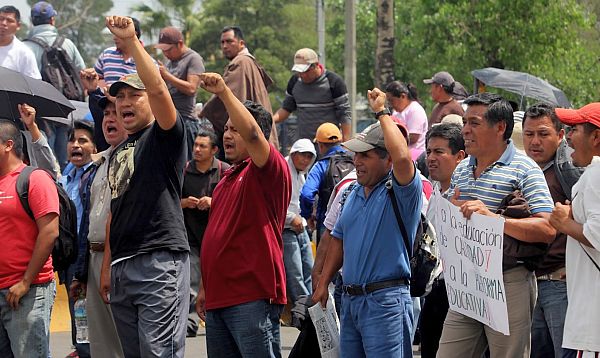Teachers from the National Coordinating Committee of Education Workers (CNTE) increased their demonstrations in the states of Michoacán, Quintana Roo, Veracruz, Chiapas, Tabasco, and Zacatecas - occupying municipal government headquarters and highways, as well as facilities of these states.
Members of CNTE, SNTE (Mexican National Educational Workers Union,) and other independent trade and labor unions ignored the calls of the local authorities to negotiate an end to the conflict caused by the education reform, Mexico newspapers reported.
Daniel López, spokesperson for Section 7 of Chiapas, said the blockades, marches, and other actions the teachers engaged in at various states in the country, are pressure tactics in order to bring the Secretariat of Government Relations back to negotiations.
"No section of the Committee has sat down to talk with any representative from the government of their states, since a mandate exists to conduct negotiations with the federal government, because this is national issue," emphasized the teacher.
With respect to the statements of the Secretary of Government Relations, Miguel Ángel Osorio Chong, indicating that agency had concluded dialogue with the CNTE, the general secretary of Section 18 of the CNTE of Michoacán, Juan José Ortega, stated that for the teaching profession, the work agenda is still in effect and is of a national character. The leader told reporters that the CNTE has not seen any attention given to the demands raised around the education reform, and so the struggle still continues.
Specifically:
• In Michoacán, Section 18 declared indefinite strikes beginning today, so that as many as 80 percent of the 11,000 school buildings in the state will close their doors.
• In Veracruz, the recently formed Popular Movement of Veracruz Teachers, an organization that brings together various independent labor and trade unions, along with the SNTE, seized the outlet valves of the Yuribia reservoir, leaving some 500 thousand inhabitants without water. Also left without water were agencies like the Mexican Institute for Social Security, Pemex, and the Valentín Gómez Farías Regional Hospital.
• In Quintana Roo, where CNTE does not have a legal presence, teachers started a blockade of highways in the evening, after a clash with riot police from the Municipal Secretary of Security in front of the Benito Juárez (Cancún) Municipal Building, that left 58 persons detained.
• In Zacatecas, teachers from all of the state regions that oppose the education reform took to the streets of the capital. The actions included blockades of administrative offices and blockades of roads that connect with neighboring states like Aguascalientes y San Luis Potosí.
• In Tabasco, the State Teachers and Popular Front remained united against the education reform, but also the energy, tax and labor reforms. The initiative, driven by the local representative of the Workers Party, Roger Arias, includes an action plan to occupy tollbooths and blockade international companies, among other things.
Original Story


